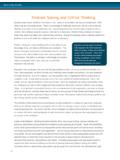Transcription of Adult Learning Techniques - CoreNet Global
1 Adult Learning Techniques CoreNet Global will give preference to proposals that are learner-centric and which demonstrate state-of-the-art Adult - Learning Techniques . Malcolm Knowles championed the word Andragogy. Andragogy focuses on Adult Learning strategies and centers attention on the process of engaging Adult learners within the structure of the Learning experience. Below are links to various articles on Adult Learning principles that may help you as you develop and format of your proposed presentation. Eight Adult Learning Principles Facilitator Of Learning Guidelines Andragogy How adults Learn Stomaching Long Conference Lectures Is Out!
2 Active Attendee Participation is In! - 14 Presentation Techniques That Encourage Maximum Learning , Participation And Memory Retention Eight Adult Learning Principles Here are eight Adult Learning principles grounded in neuroscience and andragogy, the study of how adults learn, to help guide your presentation. 1. Principle of Active Learning Active participation through discussion, feedback and activities creates more Learning than passive listening or reading. As a presenter, find ways to reduce the amount of content covered and allow the participants to discuss the content with each other.
3 2. Principle of Problem-Centric adults come to your presentation expecting to get their problems solved. They are not there just to get more information. If your presentation does not help them solve their pressing issues, it will be forgotten. adults are problem-centric, not content-centric. 3. Principle of Previous Experience New information has to be linked to previous knowledge and experience or it will not be remembered. Allow participants time to discuss with each other how the new information connects with what they already know.
4 As a speaker, sometimes you may need to help them see the connections. 4. Principle of Relevance If the information being presented is not relevant to the listener s life and work, it will not get their attention. As a speaker, your content must have meaning and immediate relevance. If your concepts are complicated or difficult to understand, the listeners will lose attention. 5. Principle of Emotional Connection Presentations that connect with a learner s emotions are more likely to be remembered, recalled and learned. Fear is not a good motivating factor for Learning as it causes the brain to react in a fight or flight syndrome.
5 Fear actually hampers real Learning . As a speaker, debrief participants after emotional stories or experiences so that they can reflect and learn from their feelings. 6. Principle of Self- Learning Adult learners have some strong beliefs about how they learn. These beliefs, whether accurate or not, can interfere or enhance their Learning . As a speaker, always explain why the audience should participate in specific activity and how the process as well as content benefits their Learning . 7. Principle of Alignment adults expect that a presenter s content, Learning outcomes and activities be aligned together.
6 If the Learning outcomes do not match the content, the learner feels disconnected and Learning is hampered. If the Learning activity seems childish or forced, Learning is lost. 8. Principle of Fun Learning should be fun! As a presenter, if you are not having fun presenting your information and facilitating Learning , then you should stop. By all means, make Learning fun, enjoyable and filled with laughter! Facilitator Of Learning Guidelines Here are seven guidelines to help speakers become facilitators of Adult Learning instead of lecturers.
7 1. The facilitator sets the initial climate of the Learning experience. Whether overtly or in subtle ways, the facilitator communicates his or her trust in the group, the individuals and the Learning process. 2. The facilitator helps clarify the purpose of the presentation as well as extract each individual s own goal. The facilitator allows participants the freedom to state why the topic is important to them. 3. The facilitator elicits each participant s purpose and leverages the motivational force behind that Learning . Even if the participant s desire is to be guided and led by another, the facilitator can accept that need and provide a course of action.
8 The facilitator is able to leverage the participant s own motivation to learn. 4. The facilitator regards his or her own identity as a flexible resource for the group. The facilitator acts as advisor, coach, counselor and one with experience in the field. The facilitator is able to express his or her own feelings and beliefs that are not seen as judgments or the only way to think. 5. The facilitator sees each participant as a resource with experiences and knowledge. As the climate becomes established, the facilitator is increasingly able to also become a participant learner.
9 6. The facilitator accepts both intellectual content and emotional attitudes from participants. The facilitator aims to give each contribution the appropriate amount of emphasis. He or she also accepts rationalizing and intellectualizing. 7. The facilitator helps participants exploit their own experiences as related to the new topic. The facilitator gears the presentation to the participants level of experience. The facilitator helps participants apply new content to their own knowledge and experience, thus integrating it. Andragogy How adults Learn Malcolm Knowles championed the word Andragogy to describe how adults learn in contrast to how children learn or pedagogy.
10 Andragogy focuses on Adult Learning strategies. It centers attention on the process of engaging Adult learners within the structure of the Learning experience. 14 Andragogy Principles Here are 14 andragogy principles based on a research that should be used to ensure a successful Learning experience. 1. Learning is fundamentally social. Learning is about more than the process of acquiring knowledge. Successful Learning is often socially constructed and can require unlearning old ways. It may require changes to one s identity and core beliefs, which can take time and is challenging, yet powerful.



